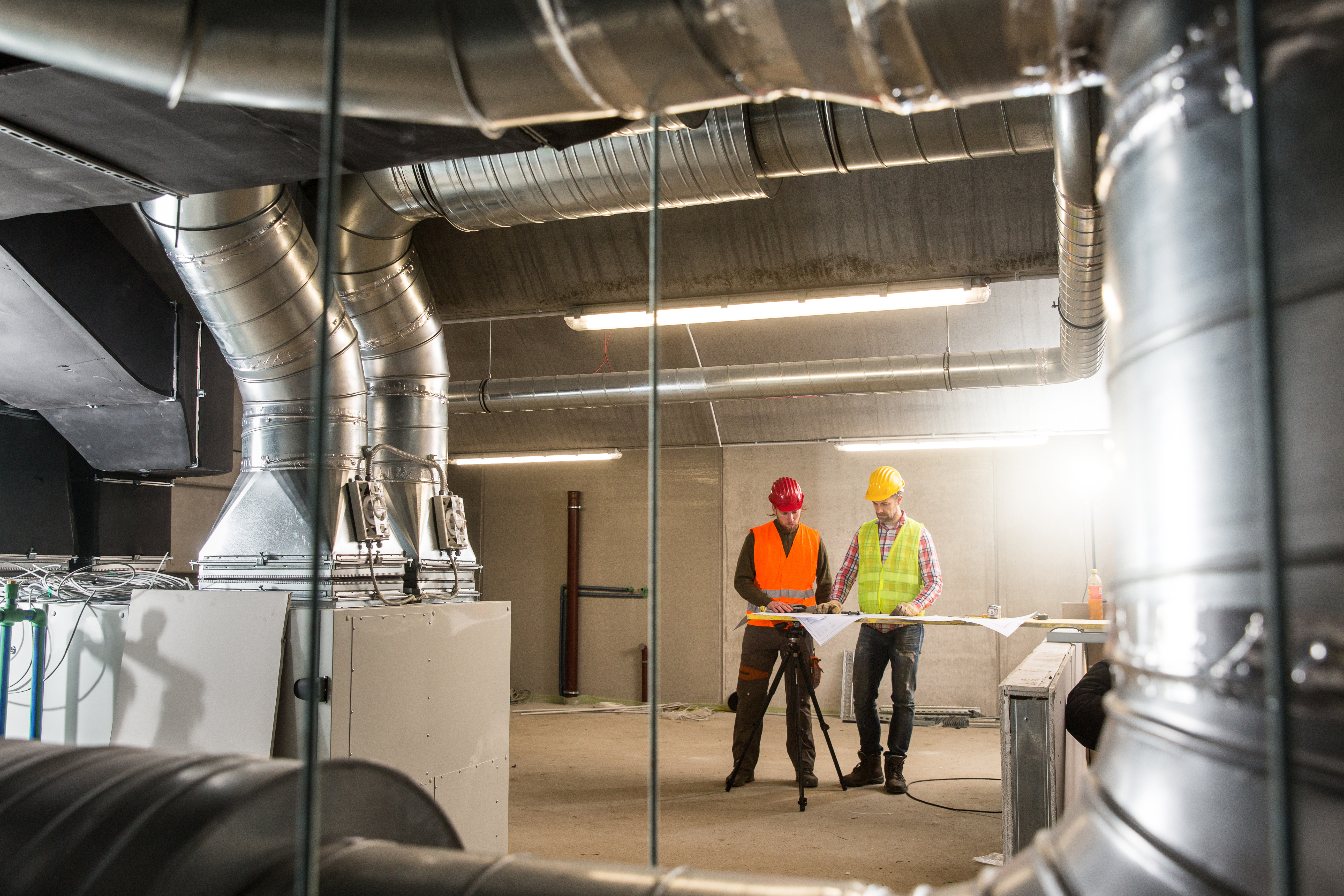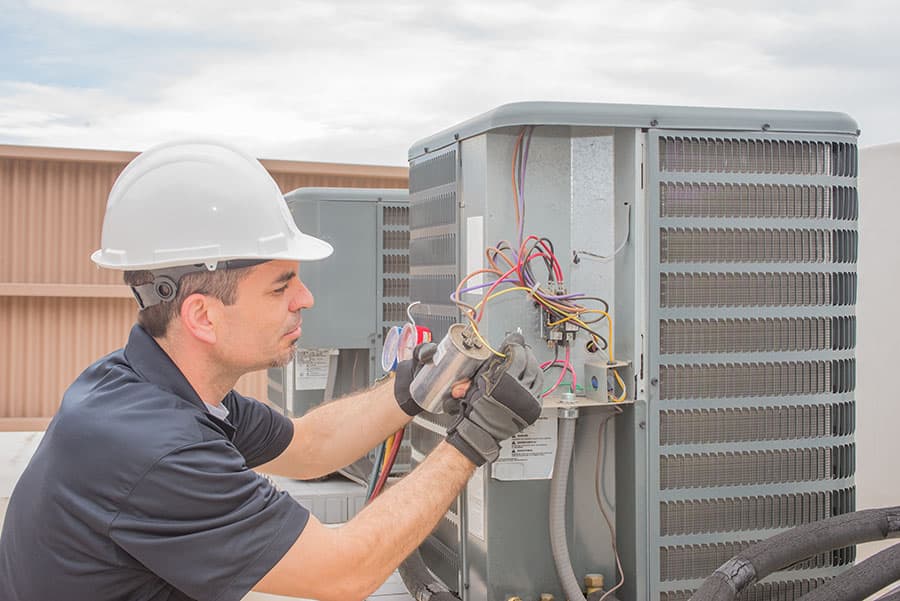Exactly How a Dependable HVAC System Enhances Indoor Air High Quality and Comfort
A reliable HVAC system is crucial for preserving indoor air high quality and comfort. It manages temperature level and moisture, producing a healthier living atmosphere. Efficient air filtering gets rid of pollutants and irritants, while appropriate moisture degrees avoid mold and mildew growth. Normal maintenance warranties peak performance, improving system efficiency. Comprehending these components reveals just how they communicate to develop a fresh atmosphere. The relationship in between Cooling and heating systems and overall health goes deeper than one may expect.
Understanding the Basics of Cooling And Heating Solutions
Heating and cooling systems, essential for contemporary convenience, encompass ventilation, air, and home heating conditioning parts that interact to control interior settings. These systems are created to keep excellent temperatures, guaranteeing that areas stay comfy no matter external weather conditions. Heating aspects, such as heating systems or warm pumps, offer heat throughout cooler months, while air conditioning devices cool down spaces when temperature levels climb.
Air flow plays a crucial function, promoting the circulation of fresh air and removing stagnant air, which assists in preserving a balanced atmosphere. Numerous kinds of a/c systems exist, including systematized and decentralized setups, each suited for different structure dimensions and objectives. In addition, modern developments have actually presented smart modern technologies, enabling for improved control over indoor climate. Recognizing these basics makes it possible for customers to appreciate how cooling and heating systems add to total health and comfort in industrial and household areas alike, laying the groundwork for discussions on their influence on indoor air high quality.
The Role of Air Purification in Indoor Air Top Quality
A significant facet of maintaining indoor air top quality works air filtering, which plays an essential role in getting rid of pollutants and allergens from the atmosphere. A/c systems geared up with high-quality filters can capture an array of impurities, consisting of dirt, plant pollen, animal dander, and mold spores. This purification process greatly reduces the concentration of airborne fragments, causing a cleaner and much healthier indoor atmosphere.
Regular upkeep of air filters is important to ensure peak efficiency. Obstructed or filthy filters can hinder airflow, reducing the system's performance and potentially allowing toxins to flow within the area. By changing or cleaning filters as recommended, property owners can boost their HVAC system's capability to give fresh air.
Humidity Control and Its Effect on Comfort
While several might focus on temperature level regulation, humidity control is just as vital for preserving convenience in interior settings. High humidity levels can bring about pain, making spaces feel warmer than they in fact are, while low moisture can cause dry skin, irritation, and boosted susceptibility to respiratory issues. A dependable cooling and heating system plays a considerable duty in managing indoor humidity, ensuring that air is neither too dry nor too moist.
Optimum moisture degrees normally vary from 30% to 50%, advertising a comfy ambience. When moisture is well-regulated, residents experience enhanced thermal convenience, improved interior air high quality, and minimized risks of mold and mildew growth and dirt mite spreading. Proper moisture control can secure furniture and architectural aspects from damages caused by excessive moisture or dry skin. Integrating reliable moisture administration into A/c systems is vital for fostering a healthy and pleasurable indoor environment favorable to health and efficiency.
The Importance of Normal Upkeep
Routine maintenance of cooling and heating systems is important for making certain peak efficiency and durability. This proactive technique not only decreases possible break downs yet likewise boosts energy effectiveness, which can lead to substantial cost financial savings in time. Scheduled inspections allow technicians to recognize and deal with concerns prior to they escalate into pricey repairs, making certain the system runs smoothly.
Additionally, regular maintenance entails cleaning or replacing filters, inspecting refrigerant levels, and inspecting ducts, all of which add to excellent air flow and system performance. By maintaining the a/c system, home owners can also protect against too much wear and tear on elements, expanding the general lifespan of the device.
A well-kept Heating and cooling system runs silently and safely, minimizing the risk of harmful circumstances. Finally, normal upkeep is a vital financial investment in both the efficiency of cooling and heating systems and the convenience of interior settings, ultimately advertising a much healthier living area.

Just How Cooling And Heating Equipment Reduce Allergens and Pollutants
Effective heating and cooling systems play an essential function in decreasing allergens and contaminants within interior settings, therefore improving overall air top quality. These systems utilize advanced purification technologies that record dust, pollen, mold and mildew spores, and family pet dander, avoiding them from distributing throughout the home. High-efficiency particle air (HEPA) filters are particularly efficient, capturing as much as 99.97% of bits as little as 0.3 microns.

Power Performance and Its Benefits for Health and wellness
Energy-efficient a/c systems not just reduce energy usage but also have considerable wellness advantages for occupants. By enhancing power use, these systems can keep constant indoor temperature levels, which aids protect against the growth of mold and mildew. Controlling moisture degrees is crucial for breathing health and wellness, as excess dampness can aggravate allergic reactions and asthma. Furthermore, energy-efficient systems usually incorporate innovative filtration technologies that improve air quality by eliminating airborne fragments and contaminants, further improving total well-being.
Additionally, lower energy intake means minimized emissions from power plants, adding to cleaner outdoor air quality, which indirectly supports the wellness of homeowners. With a focus on sustainability, energy-efficient a/c systems advertise a much healthier living environment. By investing in such systems, house owners not only conserve on energy bills yet likewise make a substantial dedication to the health of their communities and families. Ultimately, energy efficiency in cooling and heating systems fosters a healthier interior ambience for all.
Enhancing Convenience With Smart Technology Integration
As smart technology remains to develop, its integration right into HVAC systems substantially boosts indoor convenience. Smart thermostats, for example, enable customers to tailor heating and cooling routines based upon their daily routines, ensuring ideal temperatures when individuals are home. These tools can learn choices over time, readjusting setups immediately for maximum comfort.
Smart sensing units keep an eye on interior air top quality and humidity degrees, supplying real-time responses that aids maintain a healthy environment. By connecting with HVAC devices, these sensors can motivate adjustments to air movement and temperature level, guaranteeing regular convenience.
Mobile applications more empower customers, making it possible for remote of HVAC settings from anywhere, thus giving convenience and adaptability.
Regularly Asked Questions

Just How Can I Tell if My A/c System Is Reliable?
To figure out HVAC effectiveness, one can inspect energy expenses for anomalies, examine for uncommon sounds, screen temperature level consistency, warranty proper air movement, and timetable normal upkeep. These aspects collectively show the system's functional performance and efficiency.
What Indications Suggest Poor Indoor Air High Quality?
Indicators of bad interior air quality consist of persistent smells, excessive dust buildup, enhanced allergy signs and symptoms, noticeable mold development, and fluctuating humidity levels. These signs often recommend that ventilation or air purification systems may be defective or inadequate.
Can a Cooling And Heating System Assist With Family Pet Dander?

Just how Often Should I Replace My Air Filters?
Air filters must generally be changed every 1 to 3 months, depending upon usage and interior air quality. HVAC experts. Regular replacement helps preserve efficient air movement and reduces dust, irritants, and various other fragments in the home environment
What Are the Costs of HVAC System Installment?
The expenses of cooling and heating system installation commonly range from $3,000 to $7,000, depending on aspects such as system type, home size, and local labor prices. Added features might enhance total expenses substantially.
A reliable Cooling and heating system is essential for maintaining indoor air top quality and comfort. Cooling and heating systems, fundamental for modern-day comfort, include air, heating, and air flow conditioning parts that function together to control interior settings. Effective HVAC systems play an important function in minimizing allergens and pollutants within indoor settings, thereby enhancing total air quality. A Cooling and heating system can significantly lower animal dander by utilizing sophisticated filtering systems and normal maintenance (HVAC experts). The prices of A/c system installation commonly vary from $3,000 to $7,000, depending on factors such as system type, home dimension, and neighborhood labor prices